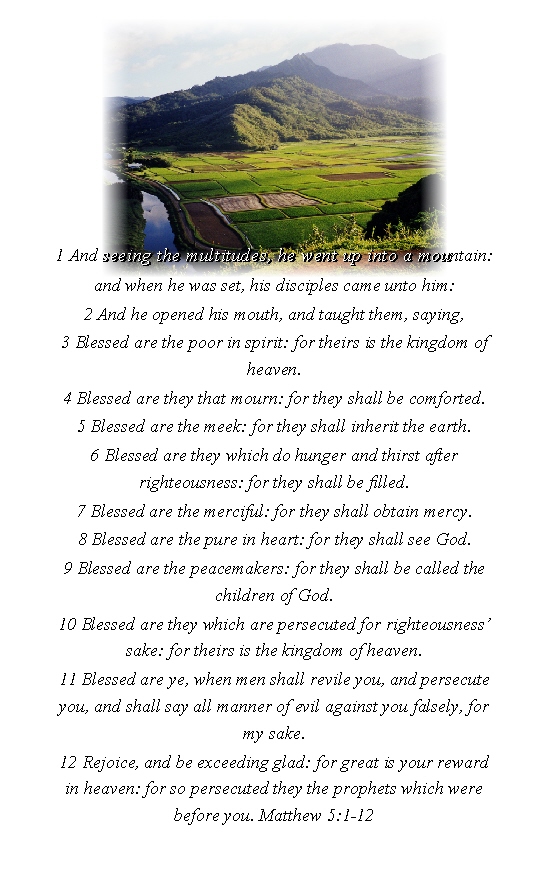

Christ in the Beatitudes
THE Beatitudes describe the ideal characteristic of a child of God in the kingdom of God. The Bible says that “the kingdom of God is not eating and drinking, but righteousness and peace and joy in the Holy Spirit" (Rom. 14:17). The word “Blessed” is repeated nine times in verses 3 to 11. The Greek word for “Blessed” is “Makarios” which means “blest,” “fortunate,” “well off” and can also be translated as “happy.” Jesus pronounces a blessing upon those who walk in the way of righteousness and who live godly lives. The blessed man is described in Psalm 1 as a man “who walks not in the counsel of the ungodly, nor stands in the path of sinners, nor sits in the seat of the scornful but his delight is in the law of the Lord, and in His law he meditates day and night” (Psalm 1:1-2). The godly man who lives such a life is promised a blessing of fruitfulness and spiritual prosperity. God’s ultimate goal and desire is to form Christ in us (Rom. 8:29; Gal. 4:19). If we look carefully at the Beatitudes we see a reflection of the character of Christ and that is how we ought to be.
Christ was “poor in spirit” and “meek.” Jesus said: “Come to me, all you who labor and are heavy laden, and I will give you rest. Take My yoke upon you and learn from Me, for I am gentle (meek) and lowly in heart, and you will find rest for your souls” (Matt. 11:28-29). The Bible says: “Let this mind be in you which was also in Christ Jesus, who, being in the form of God, did not consider it robbery to be equal with God, but made Himself of no reputation, taking the form of a bondservant, and coming in the likeness of men. And being found in appearance as a man, He humbled Himself and became obedient to the point of death, even the death of the cross” (Phil. 2:5-8). We are to imitate Christ by putting on “humility” and “meekness” (Col. 3:12).
Christ mourned and hungered and thirsted for righteousness. He mourned over the wickedness and unrighteousness of the people. We see him mourning over Jerusalem in the Gospel of Matthew saying: “O Jerusalem, Jerusalem, the one who kills the prophets and stones those who are sent to her! How often I wanted to gather your children together, as a hen gathers her chicks under her wings, but you were not willing!” (Matt. 23:37). And we see how he hungered and thirsted for righteousness when He went to the temple and found those who sold oxen, sheep, and doves and the money changers doing business. Christ was indignant of how they turned His Father’s house from “a house of prayer” (Matt. 21:13) to “a house of merchandise” (John 2:16) and “a den of thieves” (Matt. 21:13). In the same way the believer ought to be mourning over sin and unrighteousness and longing, thirsting, and hungering for righteousness. The Psalmist said: “Rivers of water run down from my eyes, because men do not keep Your law” (Psalm 119:136).
Christ was “merciful.” The Bible describes Christ as a “merciful and faithful High Priest” (Heb. 2:17). He showed mercy to the woman who was caught in adultery and told her “neither do I condemn you; go and sin no more” (John 8:11). In the same way Christ said we ought to be merciful. He told us: “Therefore be merciful, just as your Father also is merciful” (Luke 6:36).
Christ was “pure in heart.” He was “a lamb without blemish and without spot” (1 Peter 1:19). He “knew no sin” (2 Cor. 5:21). He told the Pharisees: “Which of you convicts Me of sin?” (John 8:46). In the same way we ought to be pure in heart. David asked the question in one of his Psalms: “Who may ascend into the hill of the Lord? Or who may stand in His holy place? He who has clean hands and a pure heart, who has not lifted up his soul to an idol, nor sworn deceitfully” (Psalm 24:4). The Bible says that we ought to “pursue peace with all people, and holiness, without which no one will see the Lord” (Heb. 12:14).
Christ was a “peacemaker.” He is called the “Prince of Peace” (Isaiah 9:6). We read in The First Epistle of Peter of Christ, “who, when He was reviled, did not revile in return; when He suffered, He did not threaten, but committed Himself to Him who judges righteously” (1 Peter 2:23). The Bible commands us to “repay no one evil for evil” and if it is possible, as much as depends on us to “live peaceably with all men” (Rom. 12:17-18).
And finally, Christ was “persecuted for righteousness sake.” He was hated “without a cause” (John 15:25). And He told us that we also will suffer persecution. He said: “A servant is not greater than his master. If they persecuted Me, they will also persecute you” (John 15:20). The Bible says that “all who desire to live godly in Christ Jesus will suffer persecution” (2 Tim. 3:12). Christ told us to count our persecutions as a blessing. We ought to “rejoice and be exceedingly glad” for “so they persecuted the prophets who were before you” (Matt. 5:12). We are to rejoice to the extent that we are partaking of “Christ’s sufferings” (1 Peter 4:13).
May God bring out these Beatitudes in our lives and transform us into the image of Christ!
Peter Sarkis